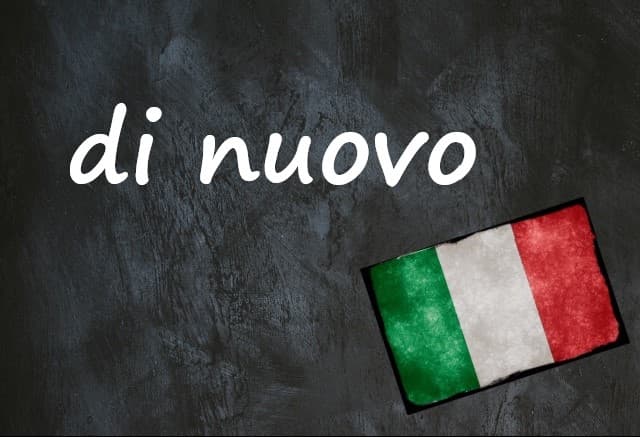
Italian expression of the day: 'Di nuovo'

This little word is worth looking at again.
Di nuovo literally means “of new” and we can use it to talk about things happening again or, of course, to talk about what's new.
For example:
Cioè, cosa c'è di nuovo?
I mean, what's new?
Allora ragazzi, facciamolo di nuovo.
Right guys, let's do it again.
But don't make the common mistake of assuming that di nuovo is the same as ancora. One of the many meanings of ancora is 'again':
Provaci ancora.
Try it again.
Grazie ancora!
Thanks again!
But, though it can be hard for non-Italians to distinguish, there is a difference in meaning.
The main difference is that ancora is often used to stress that something is continuously or still happening; that something started in the past and is still going on at present (or even in future).
Di nuovo means instead that something is being done anew or afresh – probably in a different way than before.
È pronto iniziare di nuovo
He's ready to start anew
Il professore vuole parlarvi di nuovo.
The teacher wants to talk to you again.
And if you're struggling with the Italian language, making friends here in Italy, or anything else?
Non ti preoccupare. Domani posiamo provare di nuovo
Don't worry. We can try again tomorrow.
Do you have a favourite Italian word you'd like us to feature? If so, please email us with your suggestion.
Comments
See Also
Di nuovo literally means “of new” and we can use it to talk about things happening again or, of course, to talk about what's new.
For example:
Cioè, cosa c'è di nuovo?
I mean, what's new?
Allora ragazzi, facciamolo di nuovo.
Right guys, let's do it again.
But don't make the common mistake of assuming that di nuovo is the same as ancora. One of the many meanings of ancora is 'again':
Provaci ancora.
Try it again.
Grazie ancora!
Thanks again!
But, though it can be hard for non-Italians to distinguish, there is a difference in meaning.
The main difference is that ancora is often used to stress that something is continuously or still happening; that something started in the past and is still going on at present (or even in future).
Di nuovo means instead that something is being done anew or afresh – probably in a different way than before.
È pronto iniziare di nuovo
He's ready to start anew
Il professore vuole parlarvi di nuovo.
The teacher wants to talk to you again.
And if you're struggling with the Italian language, making friends here in Italy, or anything else?
Non ti preoccupare. Domani posiamo provare di nuovo
Don't worry. We can try again tomorrow.
Do you have a favourite Italian word you'd like us to feature? If so, please email us with your suggestion.
Join the conversation in our comments section below. Share your own views and experience and if you have a question or suggestion for our journalists then email us at [email protected].
Please keep comments civil, constructive and on topic – and make sure to read our terms of use before getting involved.
Please log in here to leave a comment.